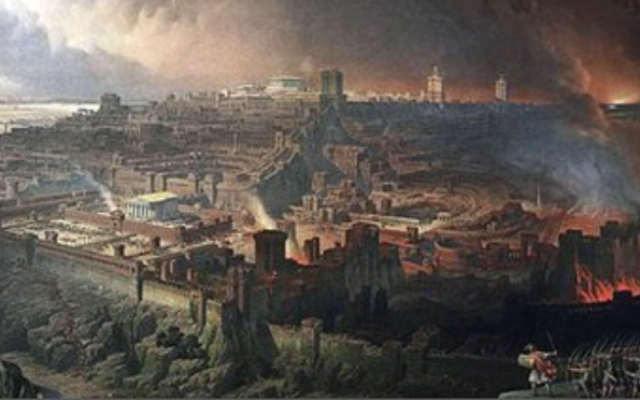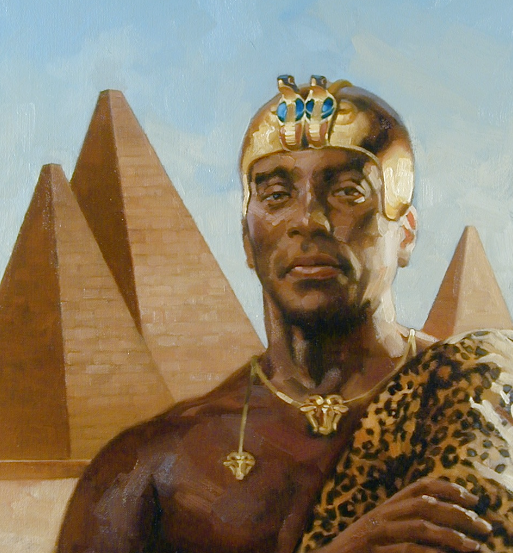Did the Black Pharaohs of Egypt Save Jerusalem?
Some Biblical scholars argue that Jerusalem was saved from annihilation by the Black Pharaohs who ruled Egypt in the 8th century.

The recent exhibit at the High Museum of Art of artifacts from the ancient nation of Nubia, in what is now Sudan, recalls the role that many historians believe saved Jerusalem from annihilation in the 8th century before the Common Era.
The small scale of the exhibit, “Ancient Nubia: Art of the 25th Dynasty,” belies the oversize influence the Black African nation played for nearly a hundred years when their pharaohs of the 25th Dynasty ruled over much or all of the powerful nation of Egypt.
While their rule from around 734 B.C.E. to 656 B.C.E. was relatively brief, their purported influence in rescuing the center of Jewish life at the time, the holy city of Jerusalem, is a story of one of the great turning points in history.
In his new book, “Why The Bible Began,” to be published at the end of October, Emory University Biblical historian Jacob Wright recounts the many versions of how the great city came to be saved 2,700 years ago.
As the Bible tells the story in 2 Kings 19:9 and Isaiah 37:9, the Kingdom of Judah and its ruler, King Hezakiah, in Jerusalem are under seige by a great Assyrian army.

The Assyrians have already conquered the northern kingdom of Israel and dispersed the 10 tribes, the so-called Lost Tribes of Israel, into the dustbin of history. Now they aim to do the same to Judah, which is seen as an easy conquest. But in 701 B.C.E., what the Bible recounts as a great miracle, the Assyrians under their ruler Sennacherib, at the last minute, withdraw and disaster is averted. Professor Wright says Hebrew scripture credits it to Divine Providence.
“G-d saves Judah. And there are multiple reasons, even in the text, for why it happens. It could be King Hezekiah just paid him off, gave all kinds of wealth to Syria and they left. But another text in the Bible says an angel of the Lord came to the camp in the night and smote them all. That’s kind of mythical, legendary, whatever. But there may be another reason historically why Assyria left Judah. And there’s no doubt that because it’s depicted in their accounts and there in their annals, and on their walls.”
But there could be another reason, help from a distant Black pharaoh, according to the Canadian writer, Henry Aubin, who wrote, “The Rescue of Jerusalem: The Alliance Between Hebrews and Africans in 701 B.C.” In his six chapter of arguments, with footnotes from 400 scholars, Aubin argues Hezakiah appealed for help from the Black pharaoh of Egypt. He responded by sending an army led by a Nubian prince, who is referred to briefly in the Bible as Prince Tirhakah, to march on the Assyrians. Whether Sennacherib was worried by having to face both the Judeans and the Egyptians or was bought off by King Hezakiah at the last moment or because of some other reason, the Assyrians broke off their siege and left Jerusalem.
Ten years later, the prince becomes one of the Black pharaohs of the 25th Dynasty and Jerusalem is spared for another hundred years or so, time enough to regain their spiritual strength under the influence of King Josiah. It is during his reign that the Book of Deuteronomy is added to the Hebrew Biblical canon and there is a newfound belief in the kingdom’s divine mission.

Biblical scholar Wright sees Jerusalem’s survival not just as a turning point in history, but a turning point in how the city see itself, as somehow blessed by G-d’s favor.
“The division in Israel in the north and Judah in south and the attempt to overcome that and to find a more a more resilient basis for some identity is how the whole Biblical project begins. Out of that comes the belief that Jerusalem can’t go down because G-d is on our side. We have been exonerated and protected; they believe. We did something for G-d to deserve this. It gives them a narrative that continues on, it gives them hope in the future. They develop the belief — that’s what our relationship to G-d has to be going forward and that’s what really produces the Bible and in all of its dimensions.”
Quite apart from how the siege of Jerusalem informs Jewish belief, the practical effect of Judah’s rescue is to preserve early Judaism for another day. Without Jerusalem’s survival, the south would have likely suffered the same fate as the Northern Kingdom.
Had Jerusalem fallen, according to University of Chicago historian William McNeill, Judaism would have ceased to exist, leaving nothing to build on centuries later.
“Think of what that would mean,” McNeill wrote, “for without Judaism, both Christianity and Islam would become inconceivable. And without these three faiths, the world as we know it becomes unrecognizable: profoundly, utterly different.”
- News
- Local
- Bob Bahr
- High Museum of Art
- Nubia
- Sudan
- Ancient Nubia: Art of the 25th Dynasty
- pharaohs
- Jerusalem
- hy The Bible Began
- Emory University Biblical historian Jacob Wright
- King Hezakiah
- Assyrians
- Lost Tribes of Israel
- Henry Aubin
- Prince Tirhakah
- Book of Deuteronomy
- University of Chicago historian William McNeill



comments